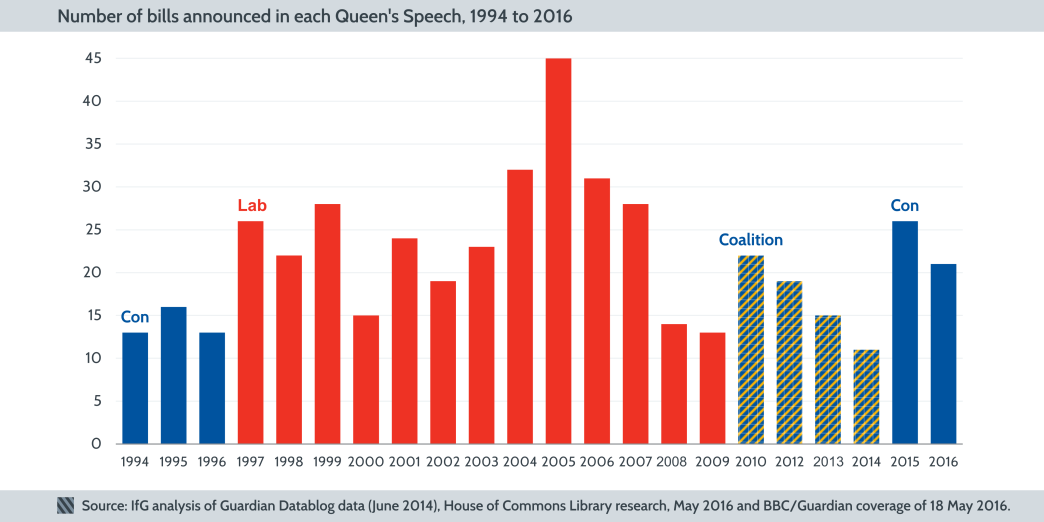The Prime Minister will have wanted the Queen’s Speech to demonstrate momentum and help secure his legacy – hence the inclusion of the ‘new standards for life chances’. However, his legacy is also highly dependent on what happens on 23 June. Against this backdrop, Daniel Thornton examines the Queen’s Speech and its implications.
Every political event is now interpreted through the lens of the European Union (EU) referendum, and yesterday’s speech laid bare the rifts that exist in the Conservative Party over the referendum. Indeed, coverage today is focused less on the substance of the speech, and more on deepening divisions in the Government. But that is to be expected, since the speech contained no surprises – of the 21 measures announced, very few could be considered new.
While we are pleased to see the Government taking a realistic approach when it comes to adding more to its already ambitious agenda of public service reform – something we encouraged before the speech – this does show just how far No 10 has been backed into a corner.
Most of the proposals in yesterday’s speech involve implementing commitments that have already been made elsewhere, such as introducing a ‘right’ to universal broadband and building one million new homes. Two education white papers are to be implemented, aimed at promoting ‘choice and competition across the higher education sector’ and creating more academy schools. The rest is largely about implementing Budget announcements such as the tax on sugary drinks, new savings schemes, and business rate retention by local authorities.
However, we expressed concern before the speech that the Government would impose significant further changes on public services that continue to face significant spending cuts, and these concerns appear to have been realised in both prison and adoption policy.
As trailed extensively before the speech, the Government will introduce a prison reform bill to extend the greater autonomy offered to NHS chief executives and school head teachers to prison governors. As we’ve said before, there is a real risk that these reforms may add more pressure onto a system already under strain. Given the continuing cuts in spending on prisons, and the relative increase in violence, many commentators are concerned that these reforms will not achieve their objectives – if prisoners are stuck in their cells all day, rehabilitation will get worse, not better.
Changes to adoption rules involve providing care leavers with the right to a personal adviser up to the age of 25, and creating a new social work regulator to focus on training and professional standards. The Department for Education budget for supporting adoption services was cut in real terms at the Spending Review, and local authorities, which are primarily responsible for adoption, are facing severe financial pressure.
The Government has not indicated whether further resources will be available to introduce these changes, so it remains to be seen how well these changes will be implemented.
Interestingly, while the Government is supportive of devolution (there will be a bill to implement devolution of powers to regulate buses) and greater autonomy for managers (prisons legislation), it is open to regulation where particular priorities are concerned. For example, every school will now have an obligation to promote the National Citizenship Service – an obligation that will presumably be enforced by Whitehall. It seems that power is flowing in the opposite direction in some cases.
Finally, in the approach to the Queen’s Speech, we made recommendations about how to improve parliamentary handling in order to increase government effectiveness, including relying more on the whips’ advice and spending more time testing ideas with backbenchers.
Judging by the reaction to the speech from some of the Government’s backbenchers, and the debates continuing in Parliament today, these recommendations remain highly relevant.
Read our full report, Government under pressure: the 2016 Queen's Speech.
